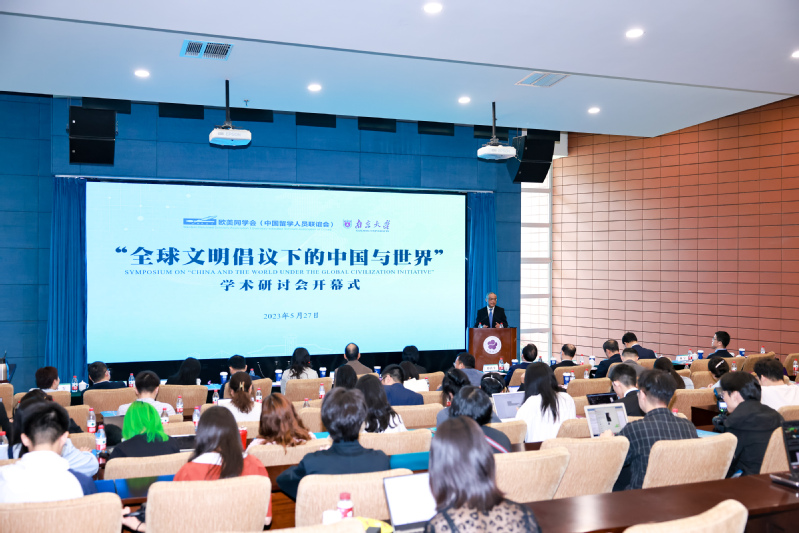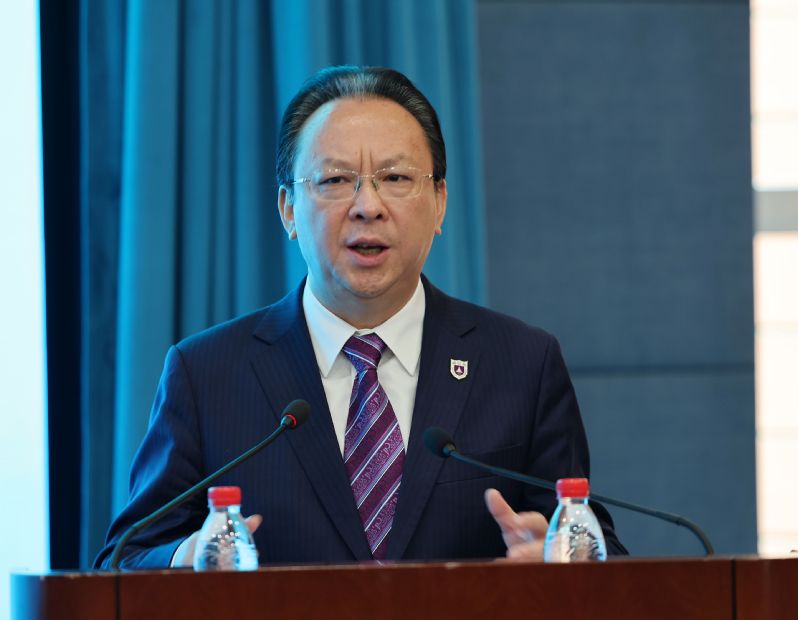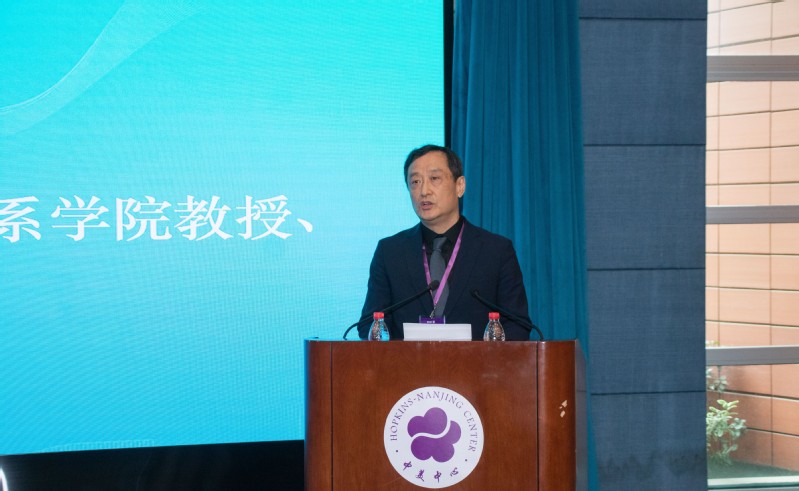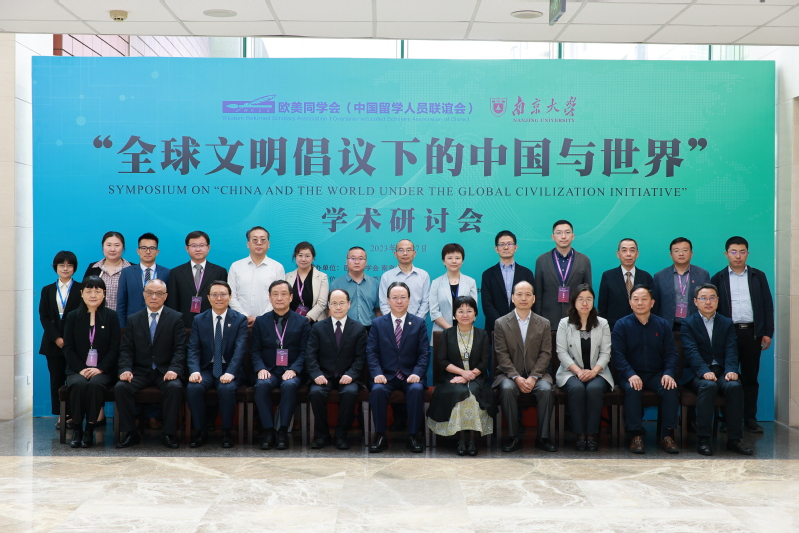On May 27, 2023, the Symposium on “China and the World under the Global Civilization Initiative” was held at Nanjing University. The Symposium is co-hosted by the Western Returned Scholars Association and Nanjing University and co-organized by the Western Returned Scholars Association in Jiangsu Province. Zhou Lan, Vice Chairman of the Jiangsu Provincial Committee of the Chinese People’s Political Consultative Conference and President of the Western Returned Scholars Association in Jiangsu Province, Tan Tieniu, Member of the Standing Committee of the Chinese People’s Political Consultative Conference, Academician of the Chinese Academy of Sciences and Secretary of the Party Committee of Nanjing University, Wang Pijun, Secretary of the Party Leadership Group and Secretary General of the Western Returned Scholars Association, attended the forum and delivered speeches, more than 100 experts, scholars, teachers and students from the Western Returned Scholars Association, Nanjing University, Peking University, Fudan University and Beijing Foreign Studies University attended the symposium. Chen Yunsong, member of the Standing Committee of the Party Committee of Nanjing University, Director of the Office of the Party Committee and Director of the Propaganda Department, presided over the opening ceremony.

In response to the “Global Civilization Initiative” proposed by President Xi Jinping at the High-level Dialogue between the Communist Party of China and the World Political Parties on March 15, 2023 and the important spirit of his congratulatory letter to the General Assembly of the Alliance for Cultural Heritage in Asia on April 25, 2023, and on the occasion of the first anniversary of General Secretary Xi Jinping’s letter to the young scholars returning from abroad to Nanjing University, and the celebration of the 110th anniversary of the Western Returned Scholars Association and the 121st anniversary of Nanjing University, the Western Returned Scholars Association and Nanjing University co-hosted this symposium to discuss Chinese and foreign people to people exchanges and global civilization, which provides a platform for academic exchanges between experts and scholars on the exchange and mutual appreciation of civilizations and the communication of the Chinese story, providing Chinese wisdom and solutions to promote the building of “a Community with a Shared Future for Mankind”.
Zhou Lan pointed out in his speech that since the current international situation is changing, the fast-developing China needs more recognition, understanding and support from the international community. Overseas students have the language advantage of international communication, the crowd advantage of covering many countries, the knowledge advantage of being familiar with the place of study and the cultural advantage of deeply understanding China, so we should gather their resources and capabilities to promote international communication and exchanges. The Western Returned Scholars Association in Jiangsu Province is willing to strengthen cooperation with Nanjing University to tell the world the story of Jiangsu’s reform and opening up, the story of its cultural heritage, the story of peace and friendship and the story of “strong economy, rich people, beautiful environment and advanced social civilization”. Moreover, we are willing to spread China’s voice through Jiangsu’s story, explain China’s philosophy through Jiangsu’s practice, build China’s image with Jiangsu’s culture, and transform Jiangsu’s cultural “soft power” into the “hard support” to the new practice of Jiangsu in constructing the Chinese Path to Modernization.

Tan Tieniu said that Nanjing University held this symposium to contribute to the innovative practice of “Global Civilization Initiative” and to further lead and inspire all the faculty and students at Nanjing University to “achieve further success and be an example” in communicating the Chinese story. Nanjing University will take the “Endeavor Action” Plan as a guide on solving difficult problems of international communication. Together with the Western Returned Scholars Association, Nanjing University will communicate the Chinese story, spread the Chinese voice, and present a credible, lovable and respectable image of China. Nanjing University will vigorously promote the theoretical research and practical exploration of “communicating the Chinese story” to better serve the construction of new Jiangsu of “strong economy, rich people, beautiful environment and advanced social civilization” and the new practice of Jiangsu in constructing the Chinese Path to Modernization.

According to Wang Pijun, to communicate the Chinese story, we need to understand China and the world at the same time. “The Global Civilization Initiative” has profoundly answered the question of modernization of human society, injecting confidence and strength to promote the coexistence, exchange and mutual appreciation of different civilizations and the modernization of human society. To deal with the problems and challenges from various aspects in the background of the unprecedented changes of the century and to promote the Global Civilization Initiative, the most fundamental and important thing is to study Xi Jinping Thought on Socialism with Chinese Characteristics for a New Era comprehensively, systematically and deeply. The returnees should play their unique role to help promote people to people exchanges and create a new landscape of cultural exchanges. The Western Returned Scholars Association and Nanjing University are willing to build a platform for jointly providing intellectual, talent and channel support for communicating the Chinese story.

The keynote speech session was hosted by Zhu Feng, Executive Dean of the School of International Studies, Nanjing University. Wang Yizhou, Dean of the Institute of Area Studies, Professor of the SIS, and Vice President of China National Association for International Studies, pointed out that there are many unprecedented challenges facing the current exchange and mutual appreciation of civilizations, and how to achieve a true intermingling of Chinese and external thoughts and culture is a major issue to be considered. We should further draw on Zhou Enlai’s diplomatic thinking and carry forward his wisdom, elegance and tolerance. Fan Jianping, president of China Radio International, gave an in-depth interpretation of the “Global Civilization Initiative”, pointing out that there is no high or low civilization. We should focus on empathetic communication, grasp the key links, adhere to the righteousness and innovation, adopt a combination of bringing in and going out, and build a global civilization dialogue and cooperation network to enhance understanding and trust, eliminate barriers and conflicts, and to promote people-to-people exchange.

In the seminar on “Dialogue of Civilizations and International Relations”, Jiang Tianjiao, Director of Center for BRICS Studies, Fudan Development Institute, pointed out that it is necessary to attach great importance to the excavation and dissemination of traditional culture, strengthen the innovation of local knowledge system and discourse system, construct the narrative strategy of new forms of civilization, and further institutionalize the mechanism of humanities exchange. Zhao Guangrui, Director of the Department of International Politics at the SIS, pointed out that there are four Western perceptions of Tibet: objective perception of Tibet, demonization of Tibet, mystification of Tibet, and mythologization of Tibet, which are rooted in political propaganda and Western egocentrism of the UK and the US, resulting in a lack of objectivity in their perceptions of Tibet. Li Guanqun, Deputy Director of the Center for East Asian Studies at Nanjing Normal University, discussed the mutual appreciation of Chinese and Russian civilizations from the perspective of the re-emergence of Chinese studies in Russia, retraced the changes in China-Russian relations since modern times, and then pointed out importance of maintaining understanding and mutual respect in the process of mutual appreciation of Chinese and Russian civilizations. Wang Wanlu, Assistant Researcher at the SIS, believed that there is a prospect of a two-way construction between the global civilization initiative and the development of Chinese regional country studies, and that the exchange and mutual appreciation of civilizations can promote the development of an autonomous knowledge system of Chinese Area Studies, while the in-depth development of Area Studies can also strengthen the exchange, mutual appreciation and tolerance of different civilizations.
In the seminar on “Cultural Exchange and International Communication”, Professor Cong Cong, Director of the Johns Hopkins University-Nanjing University Center for Chinese and American Studies, introduced the Center as an example of a platform for people to people exchange, civil diplomacy, and a platform for foreign voices and presentations, as well as an effective communication channel between China and the U.S., which helps promote people-to-people exchange between China and the U.S. Wei Xiangqing, Professor of the School of Foreign Studies at Nanjing University, cited A Concise English-Chinese Dictionary of World Canals as an example. The compilation of this dictionary realized the transition from “Chinese expression of global knowledge” to “global expression of Chinese knowledge”, demonstrating the mutual appreciation of civilizations in the process of knowledge production. Pan Nini, Associate Professor of the School of Communication, East China Normal University, discussed the history and connotations of cultural exchange between Chinese and Japanese youth, pointing out that cultural exchange between China and Japan has complex aspects and shows a shift from one-way communication to complex symbiosis today. Zhang Weijie, Associate Professor of the School of Foreign Studies at Nanjing University, compared the context in which the “Chinese story” and the “Latin American story” were developed, and reckoned that the Latin American public’s perception of the Chinese story has undergone a shift from a revolutionary narrative to a Chinese path to modernization narrative. Zhou Wenxing, Assistant Researcher at Huazhi Institute of Global Governance, Nanjing University, analyzed the international community’s analysis of the Global Civilization Initiative, expounding that countries in the global South have a positive perception of the Initiative, while there are also negative responses that discredit China. He also suggested ways to communicate the Chinese story.
In the seminar on “Cultural Heritage and Global Governance”, Zhang Liang, Professor of the Department of Philosophy and Religious Study and Vice Dean of the Graduate School, Nanjing University, reviewed the formation of the concept of “cultural heritage”. He pointed out that Marx and Engels recognized and affirmed the important role of cultural heritage in the construction of national spirit and identity, while at the same time gaining insight into the impact and destruction of the cultural heritage of non-Western pre-industrialized countries brought by colonization and trade activities. Sun Wen, Deputy Director of the Johns Hopkins University-Nanjing University Center for Chinese and American Studies, compared the cultural heritage legislation and governance models of various countries and proposed measures to enhance the integration between cultural heritage protection and national and ethnic identity by drawing on the fiscal and taxation policies, increasing financial protection efforts, and establishing a mechanism to guide diversified funding in related countries. Wu Hao, Associate Professor of the Academy of Regional and Global Governance at Beijing Foreign Studies University, talked about four cases of international exchange of cultural heritage and argued that the significance and mission of cultural heritage in the implementation of global civilization initiatives lies in the construction of ritual space, the significance of visual integration, and the monumentality for the implementation of global civilization initiatives. Chen Wei, Associate Professor of the School of Marxism at Dalian University of Technology, analyzed international cooperation on cultural heritage from the perspective of diplomacy, arguing that there exists cultural heritage diplomacy as an issue and cultural heritage diplomacy as a medium, and identified different forms and mechanisms of both. Zong Huawei, Researcher at the Institute of Area Studies at Nanjing University, argued that global governance of cultural heritage is a cultural diplomacy capability. He emphasized the need for upholding a global cultural vision and cultural confidence in the new era, promoting dialogue among civilizations in an internationalized way, and pushing for long-term implementation of global civilization initiatives.
It is reported that on February 19 this year, the forum on “Learning and Implementing the Spirit of the 20th CPC National Congress and Writing a New Era of Study Abroad for the Nation” was held at Nanjing University. At the opening ceremony of the forum, the Western Returned Scholars Association and Nanjing University jointly released the “Initiative of Striving for a New Journey to Study Abroad for the Country” and jointly established the Research Center of “Communicating the Chinese Story”. The center aims to further study and implement the spirit of the 20th CPC National Congress and the spirit of General Secretary Xi Jinping’s letter to the young scholars returning from abroad to Nanjing University, and to gather the wisdom and strength of the talents returning from abroad so as to contribute to “Strengthen cultural confidence, Communicate Chinese story”.

The symposium was organized by the Western Returned Scholars Association-Nanjing University Research Center of “Communicating Chinese Story”, the School of International Studies, the School of Foreign Studies and the Johns Hopkins University-Nanjing University Center for Chinese and American Studies. The researchers and experts focused on the theoretical connotation and practical path of the “Global Civilization Initiative”, explored important topics including the exchange and mutual appreciation of civilizations and the construction of new international relations, cross-cultural exchanges and international communication capacity building, cultural heritage protection cooperation and the construction of a global civilization dialogue network, in efforts to provide more theoretical support for promoting the innovative practice of the Global Civilization Initiative. (Wang Wanlu, Yao Yuan)


